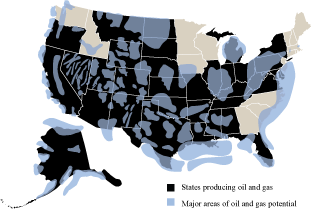|
Natural gas and crude oil provide two-thirds of our Nation's primary energy supply and will continue to do so for at least the next several decades, even as we transition to a more sustainable energy future. The natural gas resource estimated to exist within the United States is large, but because this resource is increasingly harder to locate and produce, new technologies are required to extract it in a timely manner to support a growing economy. This is also true for the domestic oil resource, much of which will need to be produced from very deep water, forced from residual pockets left in older reservoirs, or extracted from unconventional deposits, all of which are difficult to develop with existing technology, even at current prices.
|
 |
|
Today, oil and natural gas are produced in over 30 states. The U.S. is the world's second largest producer of natural gas and the third largest producer of oil. Nearly every region of the country has oil and natural gas potential. |
Some of these challenges were highlighted in the Energy Policy Act of 2005 (EPACT) which mandated a new oil and gas research and development program called the Ultra-Deepwater and Unconventional Natural Gas and Other Petroleum Resources Program. Title IX, Subtitle J, Sec. 999 has specific directives "to maximize the value of natural gas and other petroleum resources of the United States, by increasing the supply of such resources, through reducing the cost and increasing the efficiency of exploration for and production of such resources, while improving safety and minimizing environmental impacts." The EPACT Sec. 999 public/private partnership benefits consumers by developing technologies to increase the Nation's domestic oil and gas supply and reduce our dependency on imports. Key aspects of the program include utilizing a non-profit consortium to manage the research, establishing two federal advisory committees, and funding of $50 million per year derived from royalties, rents, and bonuses from federal onshore and offshore oil and gas leases.
In November 2005, Fossil Energy's National Energy Technology Laboratory (NETL) issued a solicitation for a consortium to manage this research and development program. The Research Partnership to Secure Energy for America (RPSEA) was selected to administer the research. RPSEA was formally awarded the contract in January 2007.
The consortium will manage research, development, demonstration, and commercialization efforts aimed at advancing technologies in three major focus areas: ultra-deepwater architecture and technology, unconventional natural gas and other petroleum resources, and the technology challenges faced by small producers. Under EPACT's funding provisions, the ultra-deepwater architecture and technology portion receives 35 percent of the total program's funding with unconventional resources receiving 32.5 percent. Technology for small producers receives 7.5 percent. RPSEA may use up to ten percent of these funds for program administration. In addition, complementary research at the NETL will receive 25 percent. The first annual plan was approved in August 2007 by the DOE. RPSEA has issued competitive solicitations for research proposals in the three program areas. The research priorities are contained in the annual plan. NETL will oversee the activities of the consortium. In October 2007, RPSEA released its first request for proposals (RFP) focusing on the Unconventional Gas and Other Petroleum Resources Program Element and the Small Producers Program Element. RPSEA also released the first set of request of proposals for the Ultra-Deepwater Program Element in November 2007. On Nov. 11, 2008, RPSEA announced that an RFP for the Unconventional Resources program and an RFP for the Small Producers Program has been issued. The 2008 RFP for the Ultra-Deepwater Program was released on September 23, 2008.
NETL In-house Research will be complementary to the consortium's program and will be performed in NETL labs and at partnering universities. The NETL Office of Research and Development (ORD) will implement this portion of the overall oil and gas research & development program. Research to be conducted by ORD will be guided by the results of roadmapping exercises and ongoing discussion with industry and university research partners. One principal area of complementary research will involve the Center of Drilling Under Extreme Conditions, a new facility at NETL for observing and modeling the performance of drilling equipment and fluids under high pressure and high temperature conditions. Other complementary research focus areas will include studies related to the environmental impacts of oil and natural gas development, enhanced and unconventional oil recovery, and resource assessment.
Two federal advisory committees, the Ultra-Deepwater Advisory Committee (UDAC) and the Unconventional Resources Technology Advisory Committee (URTAC) advise the Secretary of Energy on the program's development and implementation and review and comment on the program's annual plan. The advisory committees are managed by the Fossil Energy Office of Oil and Natural Gas.
|
 |
 |
 |
QUICK FACTS/LINKS
 |
|
PROGRAM CONTACTS
 |
> |
John Duda
National Energy Technology Laboratory
3610 Collins Ferry Road, P.O. Box 880
U.S. Department of Energy
Morgantown, WV 26507
304-285-4217 |

|
> |
Elena Melchert
Office of Fossil Energy
(FE-32)
U.S. Department of Energy
Washington, DC 20585
202-586-5095 |

|
|